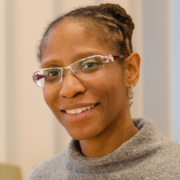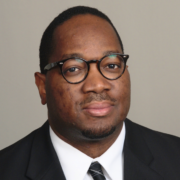Tawanna Dillahunt and Michel A. Kinsy Receive the Inaugural Skip Ellis Early Career Award
CRA-WP is honored to announce Tawanna Dillahunt of the University of Michigan and Michel A. Kinsy of Boston University have been selected as the first recipients of the Skip Ellis Early Career Award.
The Skip Ellis Early Career Award honors the late Clarence “Skip” Ellis, who was the first African-American to both earn a Ph.D. in computer science and be elected a Fellow of the ACM. This award is given annually by CRA-WP to a person who identifies as a member of a group underrepresented in computing (African-American, Latinx, Native American/First Peoples, and/or People with Disabilities), who has made significant research contributions in computer science and/or engineering and has also contributed to the profession, especially in outreach to underrepresented demographics.
This year, recognition was warranted beyond the award winners and additional nominees are receiving the Distinction of Honorable Mention. Cindy Rubio González of the University of California Davis is recognized by both the Anita Borg Early Career Award and the Skip Ellis Early Career Award committees for a joint Honorable Mention.
CRA-WP is proud to celebrate the growing representation in computing research by highlighting the recipients for their significant contributions and outreach in the field. It is encouraging to see the growth in the excellent computing researchers from diverse backgrounds committed to scholarly excellence and equal opportunity. Thank you to everyone who took the time to submit a nomination for this year and we hope to see many more in the next cycle.
About the Awardees
 Tawanna Dillahunt
Tawanna Dillahunt
Tawanna Dillahunt is an Associate Professor at the University of Michigan’s School of Information (UMSI) and holds a courtesy appointment with the Electrical Engineering and Computer Science Department. Working at the intersection of human-computer interaction; environmental, economic, and social sustainability; and equity, her research investigates and implements technologies to support the needs of marginalized people. She and her team have developed digital employment tools that address the needs of job seekers with limited digital literacy and education; assessed real-time ridesharing and online grocery delivery applications among lower-income and transportation-scarce groups, and proposed models for novice entrepreneurs to build their technical capacity.
Tawanna has received funding to support her research from the National Science Foundation, the Gates Foundation, UM Poverty Solutions, UM Ginsberg Center, and the UM Ford School. Her work appears in the most prestigious HCI conferences and journals and has won several best papers and honorable mentions. She holds a Ph.D. and M.S. in Human-Computer Interaction from Carnegie Mellon University, an M.S. in Computer Science from the Oregon Health and Science University, and a B.S. in Computer Engineering from North Carolina State University. She was also a software engineer at Intel Corporation for seven years.
Tawanna has demonstrated commitment to supporting underrepresented people and communities. She is a Digital Inclusion Policy fellow mentor for UM Poverty Solutions and is a member of the Advisory Committee for the University of Michigan Center for Academic Innovation. The nature of her research alone enables her to work with a diverse set of passionate students and community members who have been attracted to her research. She directs the Social Innovations Group and has mentored numerous master’s, undergraduate, and high school students, and postdocs, over half whom are women and underrepresented minorities. She actively participates in programs that benefit underrepresented groups and engages in community-based participatory research.
 Michel A. Kinsy
Michel A. Kinsy
Michel A. Kinsy is an Assistant Professor in the Department of Electrical and Computer Engineering at Boston University (BU), where he directs the Adaptive and Secure Computing Systems (ASCS) Laboratory. He focuses his research on computer architecture, hardware-level security, and efficient hardware design and implementation of post-quantum cryptography systems. He has published over 60 research articles, many in top-tier conferences and journals, including the International Symposium on Computer Architecture, International Symposium on High-Performance Computer Architecture, IEEE International Symposium on Hardware Oriented Security and Trust, IEEE Transactions on Computer-Aided Design of Integrated Circuits and Systems, and IEEE Transactions on Computers.
Michel is an MIT Presidential Fellow. He earned his Ph.D. in Electrical Engineering and Computer Science in 2013 from the Massachusetts Institute of Technology (MIT). In his doctoral work, he introduced some of the first algorithms and innovative hardware techniques to emulate and control large-scale power systems at the microsecond resolution. The work inspired further research by the MIT spin-off Typhoon HIL, Inc. Before joining the BU faculty, Michel was an assistant professor in the Department of Computer and Information Systems at the University of Oregon, where he directed the Computer Architecture and Embedded Systems (CAES) Laboratory. From 2013 to 2014, he was a Member of the Technical Staff at the MIT Lincoln Laboratory, where he led the Advanced Computer Architecture Concepts sub-group tasked with exploring future secure computing architectures in critical DoD systems.
Michel is a mentor who inculcates a culture of embracing diversity, intellectual honesty, excellence in research, social responsibility, and personal integrity among the mentees in his research laboratory – three of them are underrepresented doctoral students. His outreach efforts include creating the University of the Virgin Islands Summer Cybersecurity Program; organizing ACM Richard Tapia Celebration of Diversity in Computing Conference workshops on open-source computer architecture design space exploration and post-quantum cryptosystem design; introducing a computer science module into the Oregon Young Scholars Program for preparing historically underserved students for college, and the University of Oregon African-American Rites of Passage Program





